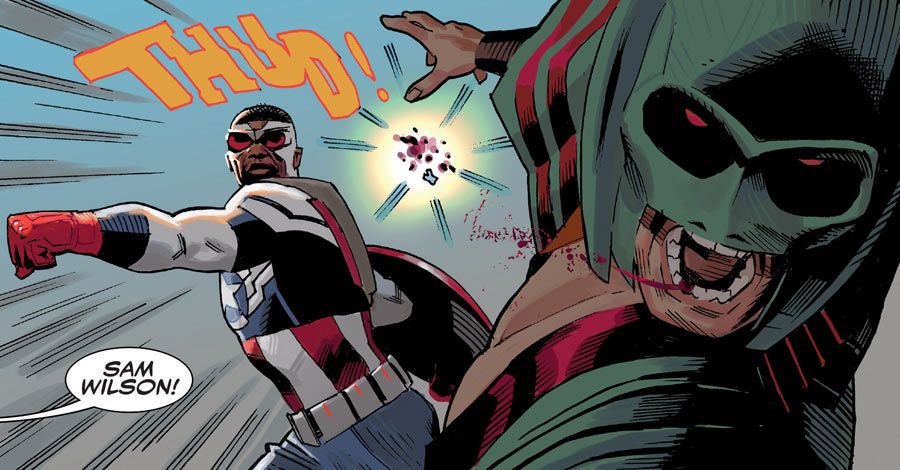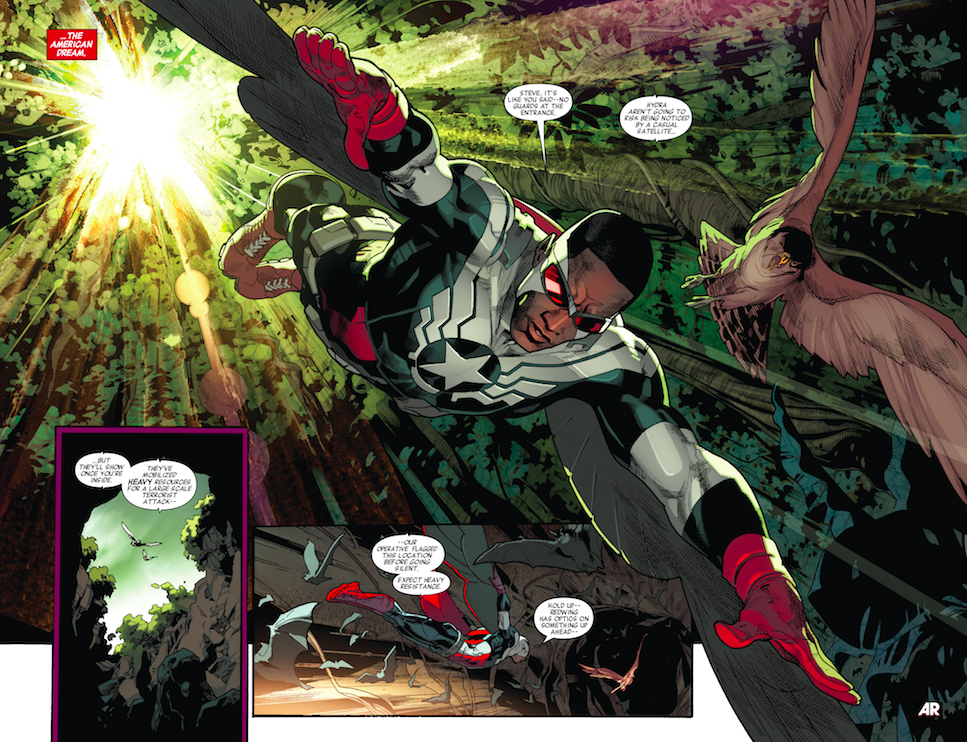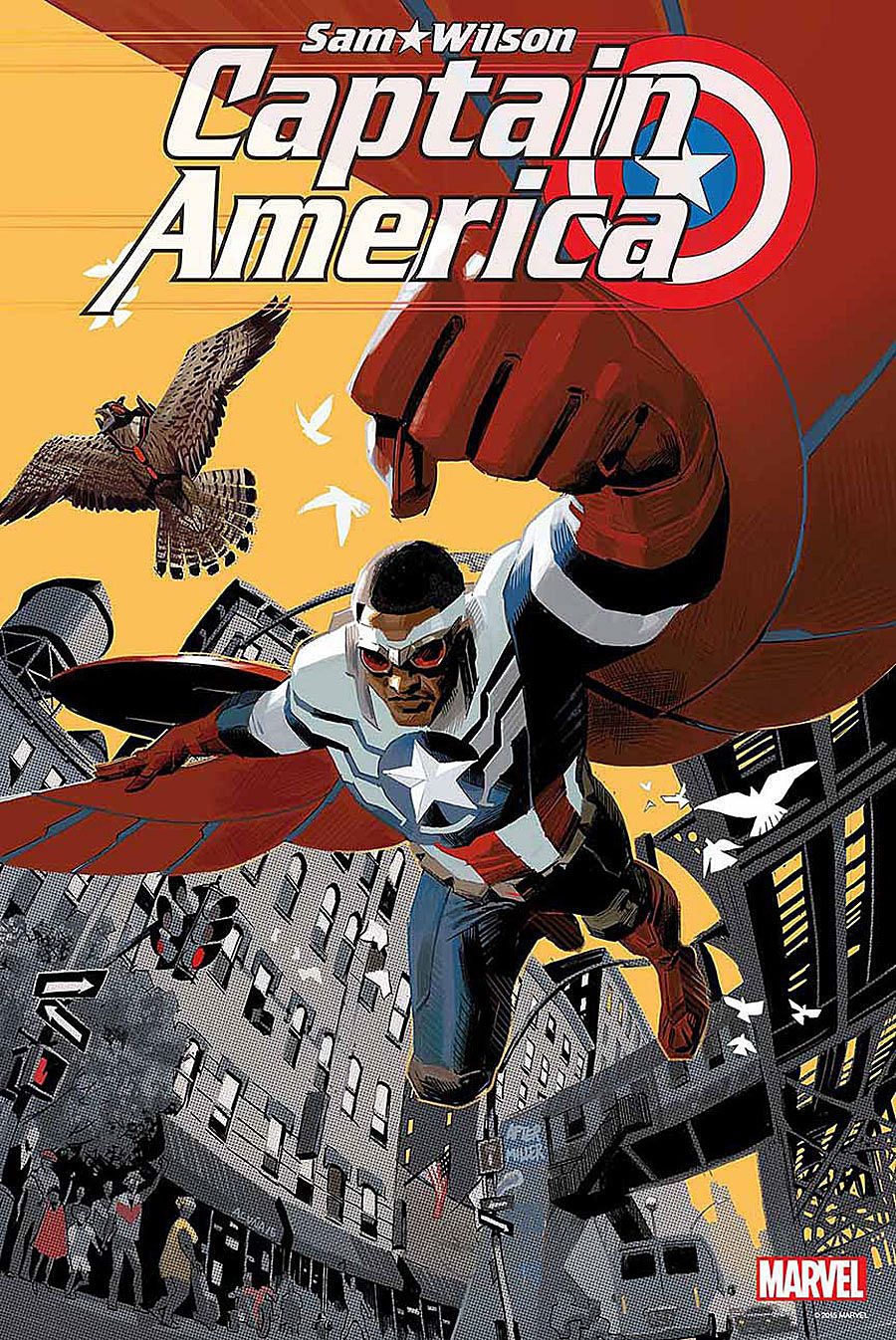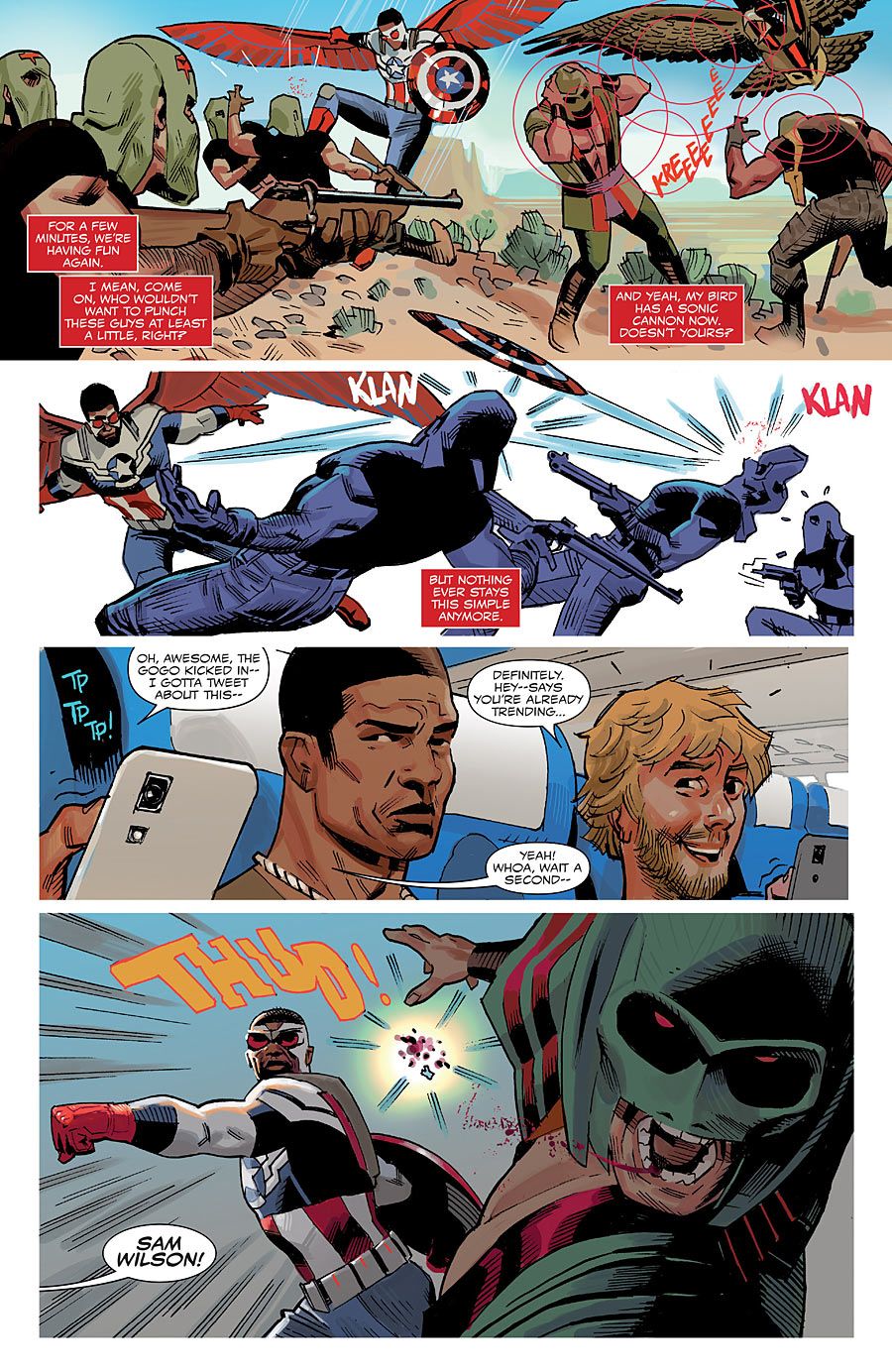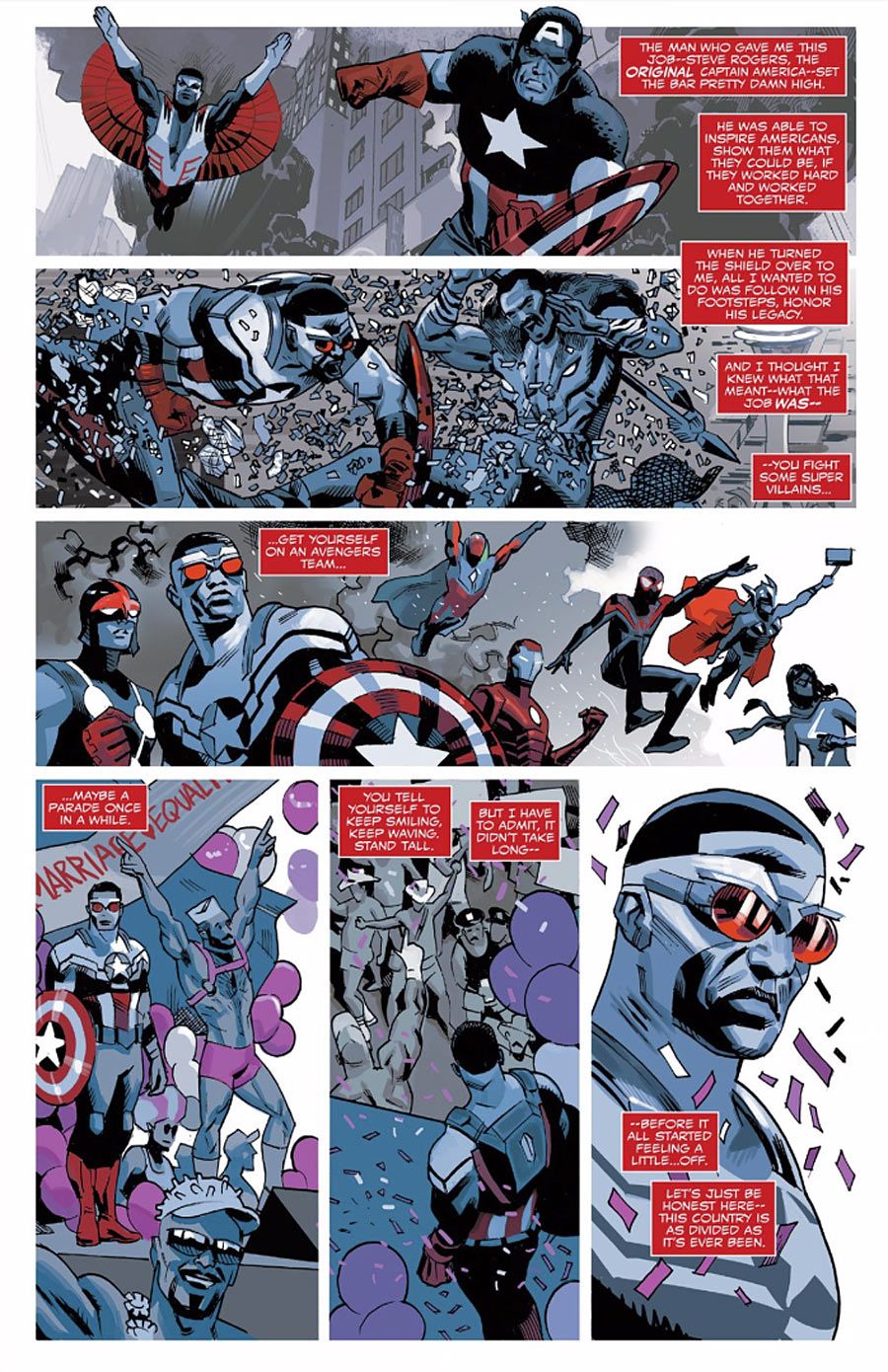For various comic book consumers, there is the moment.
The one in which you decide to buy that comic book, hopeful that you will be rewarded for your faith, even though your gut tells you that disappointment lurks within its pages.
It can be contingent on a number of factors, from creators to a "new" status quo which promises to "shake the foundations" of a character and his or her world, or a line-wide revamp of a publisher's mythology.
Marvel's "All-New, All-Different" relaunch, utilizing a term for their once-top-selling characters the X-Men and spinning out of the event series "Secret Wars," has likely brought a number of buyers to that moment.
For me, it had a second layer, regarding the new Captain America, Sam Wilson.
On October 14, Marvel Comics released the first issue of "Captain America:Sam Wilson," and a part of me didn't want to buy it.
The preceding series, "All-New Captain America," the first issue of which was released on November 12, 2014, was a disappointment, for me.
Despite what appeared to be good intentions on the part of writer Rick Remender, "All-New Captain America" scratched the surface of the undeniable import of a Black man being Captain America through flashback sequences and various comments from the character's enemies. However, it lacked the social gravitas implicit in the idea of a Black, male superhero wearing an American flag during these turbulent times.
The organizations of authority are assaulting and marginalizing the Black man, in particular, so failing to touch upon that is noteworthy.
Additionally, the lack of a Black writer, through which to bring an authenticity of experience to the narrative, gave me pause.
Therein lied the catch-22, because I did not believe in the full package of "All-New Captain America," but I purchased the monthly series because it had a certain level of quality, and more importantly lack of support could be used as an argument by the publisher's bean counters to produce less books in the future featuring Black superheroes as leads.
I imagine other Black consumers had to deal with the same conflict, taking one for the team month after month, to help facilitate a greater impact through years.
So when less than a year later Marvel puts out another first issue of a new, Black Captain America series, the adage starting with "Fool me once..." came to mind.
And once again, the writer was not Black.
"Fool me once..."
But the writer, in this case, is Nick Spencer. I've read a number of his works, noting his skillful handling of characters from different lifestyles and ethnic backgrounds, and his introductory arc of Skybound's "Thief of Thieves" series impressed me enough that I was willing to take that dive again.
And this time, like a number of other Black consumers, I imagine, I was rewarded for my faith.
"Captain America: Sam Wilson" passed my test of value by starting to engage the truth of America's ideological hypocrisy when it comes to people of color, citizens and otherwise.
The first issue did this to such a degree that it gained the ire of Fox News, which is a win, as far as I'm concerned.
Captain America should always stand for the American Dream, and thus should always be in conflict with the American Reality.
Stories of Captain America without that premise, as subtext or otherwise, are a disservice to the character.
With "Captain America: Sam Wilson" tapping into the well of social issues, without flinching or sugar-coating the approach, it made me wonder how Marvel Comics failed to accomplish the same in "All-New Captain America."
Why did they wait until the second volume to go right for the bullseye with the thematic import of Sam Wilson as Captain America?
Maybe they were softening up the general audience.
They didn't want to come out the box and potentially alienate the portion of Captain America's audience which has no interest in socio-political issues of race in America.
Get everyone to accept Captain America, using the theme of the Black man trying to live up to the White man predecessor as a soft massage, before getting to the real heart of the matter.
Maybe they realized if yet another series with Sam Wilson as Captain America failed to look into the eyes of America's social ills, it would reveal a crack in their claimed desire to have more meaningful diversity in their line of superhero comics.
"All-New, All-Different" would end up meaning exactly the opposite.
But I don't believe either, alone.
I believe both, in combination with calculated strategy.
Marvel used up their major Black Captain America promotional power with the media in the launch of "All-New Captain America," so a new series could not get them a significant amount of additional publicity.
But a new series that would dig deep into the social narrative, to a degree that it would predictably get Fox News and various other outlets to cry and whine and complain, would kick off a whole new wave of promotion.
Marvel knew this, and they probably banked on it.
Banked on the discussion of Captain America's political origins taking place in American media and social media, which is part of the greater discussion about the conflict between Captain America and America, itself.
And, within the industry of creators, providers and consumers, the discussion of what we want from our fiction.
Comic book fans can be broken up into many camps, many "one or the others," and one of those double-sided categories would be the fans who like their fiction to reflect the world in which they live, or the fans who want total escape from the world in which they live and don't require their fiction to resemble it.
The fight for approval of, and understanding from, the public which takes place in the pages of "Captain America: Sam Wilson" is the meta statement on Marvel's fight with the consumer base.
Both fights have stakes, and are directly connected to profit and socio-political issues.
The America of the Marvel Universe has to decide if they believe in what America stands for, more than what it has become.
The readers of "Captain America: Sam Wilson," and potential new readers, will decide with dollars and support, or the lack thereof, if they believe in comic books which hold a mirror up to the world.
Reflecting back its ugliness, hypocrisy and bile.
Showing a distorted view of an idealistic claim.
Our actions have impact in the real world, and our purchasing choices do, as well.
They're intertwined.
It comes down to what you want from your stories and the industries which provide them.
The conceit of Marvel Comics has, for a long time, been that their books reflect the world in which we live.
With "Captain America: Sam Wilson," the publisher has lived up to that claim with more transparency of intent than in stories like "Civil War" and "Secret Invasion."
That means more than all of Captain America's rogues gallery of supervillains put together.
I'm in for the world of "Captain America: Sam Wilson," with no desire to escape.
Joseph Phillip Illidge is a public speaker on the subjects of race, comics and the corporate politics of diversity. In addition to his coverage by CNN Money, the BBC and Publishers Weekly, Joseph has been a speaker at John Jay College of Criminal Justice, Digital Book World's forum, Digitize Your Career: Marketing and Editing 2.0, Skidmore College, Purdue University, on the panel "Diversity in Comics: Race, Ethnicity, Gender and Sexual Orientation in American Comic Books" and at the Soho Gallery for Digital Art in New York City.
Joseph is the Head Writer for Verge Entertainment, a production company co-founded with Shawn Martinbrough, artist for the graphic novel series "Thief of Thieves" by "The Walking Dead" creator Robert Kirkman and video game developer Milo Stone. Verge has developed an extensive library of intellectual properties for live-action and animated television and film, video games, graphic novels and web-based entertainment.
His graphic novel project, "The Ren," about the romance between a young musician from the South and a Harlem-born dancer in 1925, set against the backdrop of a crime war, will be published by First Second Books, a division of Macmillan.
Joseph's newest comic book project is the upcoming Scout Comics miniseries "Solarman," a revamp of a teenage superhero originally written by Stan Lee.

